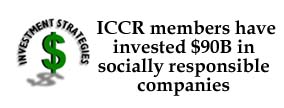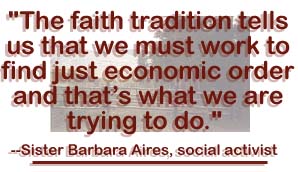|
Mixing business and faith
|
 |
April 2, 1999: 3:43 p.m. ET
Religious groups are big stakes players in socially responsible investing
|
NEW YORK (CNNfn) - Sister Patricia Daly is what you might call a thorn in the side of Corporate America.
The Catholic nun, who's environmental debate with General Electric Chairman Jack Welch escalated into a widely publicized shouting match last year, spends most of her time fighting for socially responsible shareholder resolutions.
She travels the country, meeting with top executives of multi-national corporations. She delivers speeches and she rallies support for everything from workplace diversity to sweatshop bans. It all comes down to this.
"It's shareholder season from April to late July," said Daly, an advocate for social responsibility in big business since 1977. "There are about six to eight weeks where I could hit two or three shareholder meetings a week. It gets pretty hectic."
Praying for change
The Socially Responsible Investment (SRI) community is a tight knit group that bridges the gap between religious denominations. Over the last decade, it also has gained momentum in secular circles.
Daly said the Catholic sisterhood collaborates with representatives of Protestant investment organizations, Jewish groups and deep pocket institutional investors on a range of social and environmental issues.
"You'd probably be amazed at how much we cover with very little expense," she said. "I'll cover (a shareholder meeting) for one of the Protestant denominations at a meeting in New York near my office, for instance, and to save on my travel costs, someone might represent me in another part of the country. It is an incredible network."
The season of change
Socially Responsible Investing (SRI) has its roots in religious ideology.
A century ago, the United Methodist Church proclaimed it a sin to profit from any business involved in the tobacco or alcohol trades, thereby establishing one of the first social investment screens in the country. The Quakers also rejected profit from products and the slave trade.
"Religious institutions have been leaders in this field for a long time, and they remain leaders," said Elizabeth Elliott McGeveran, of the Social Investment Forum. "A lot of the really socially important shareholder advocacy work is done by religious investors."
These days, most religious sectors have implemented similar screens, preventing their pension funds and endowments from investing in companies tied to the manufacturing of weapons, the gaming industry and those with a disregard for human rights. Among them: Catholics, Presbyterians, Baptists, Episcopals and the United Church of Christ.
"We are pressing real hard and we keep at it," said Sister Barbara Aires, coordinator of corporate responsibility for the Congregation of Sisters of the Incarnate Word in Houston, Texas. "The faith tradition tells us that we must work to find just economic order and that's what we are trying to do."
Many hospitals supported by the church, including St. Joseph Mercy Health System in Ann Arbor, Michigan and the Catholic Health Initiative in Denver, Colo., also take a socially responsible approach to investing.

Buying stock for clout
Collectively, the 275 mostly Christian organizations and investment groups that belong to the Interfaith Center for Corporate Responsibility (ICCR), a non-profit group, hold a total of about $90 billion in their pension funds and other investment portfolios.
"They (churches) represent a tremendous amount of money (invested)," said ICCR executive director Tim Smith.
Of the $1.2 trillion invested in socially responsible companies each year, the Forum estimates that $652 billion is allocated to shareholder advocacy work by institutional investors, a large percentage of which are religious organizations.
Members of the Jewish faith also are actively involved in the fight for social change in America.
Rabbi Arthur Waskow, director of the Shalom Center in Philadelphia, works closely with Sister Daly on a campaign to encourage GE (GE) to educate the public on the hazards of eating fish out of the Hudson River. Environmental groups claim the fish are contaminated as a result of the PCB toxins the company legally dumped into it before the EPA stepped in. (It has since spent millions of dollars in a clean-up effort).
Waskow also joined the so-called Redwood Rabbis in Northern California, a group dedicated to stopping Houston-based Maxxam Inc. from logging the ancient growth redwoods. He said the company's top executive is Jewish and an active member of the religious community.
"We think the redwoods are important ecologically and symbolically," Waskow said. "But we also wanted to raise the question of how to bring to bear on a member of the Jewish community the standards and ethics we thought he was violating."
Taking a stand
This year, Smith said ICCR members filed 154 socially responsible proxy resolutions with 111 companies (some companies got more than one).
Industrywide, there were roughly 200 SRI proxy resolutions filed to 150 companies each year.
The resolutions, being voted upon at annual stockholder meetings over the next few months, speak to a variety of issues, but many focus on encouraging gender and ethnic diversity in the upper management ranks of Corporate America.
A large number of them also ask multi-national corporations to tighten up their methods for monitoring their exposure to products made in sweatshops.
Companies involved in the auto and oil trades also will be tallying up proxy votes this year on a variety of issues surrounding the global warming debate and the impact their manufacturing processes are having on the environment.
Exxon (XON) recently lost its fight with the Securities and Exchange Commission to keep the issue off its proxy. Shareholders will get a chance to vote on the resolution in May.
The goal with the auto industry, Daly said, is to pressure Ford (F), General Motors (GM) and Chevron (CHV) to disengage from an association called the Global Climate Coalition, which takes the position that global warming is not yet backed by scientific fact.

Institutions
While religious organizations comprise one of the largest components of socially responsible investors, not all have religious ties.
The Teachers Insurance and Annuity Association-College Retirement Equities Fund (TIAA-CREF), for example, is the largest socially and environmentally responsive investment tool in the country.
The fund introduced a social choice option to plan participants nine years ago, screening out tobacco-related companies. It now has more than $2.1 billion under management, the Social Investment Forum and Co-op America Industry Research Program report.
Other pension funds and non-profit groups that have either divested of or begun offering "tobacco free investment options" include the American Medical Association Pension Fund, New York Life Insurance Co., Prudential insurance fund (sold tobacco stocks in its general account) and the Salvation Army.
Similarly, Citizens Group Funds, the nation's largest family of socially responsible no-load mutual funds, screens out companies involved in alcohol, tobacco, nuclear power and oil. It also refuses to invest in companies with inadequate representation of women and African Americans on its boards or upper management levels.
Together, the five Citizens Funds have assets of $955 million. They are all rated with either four or five stars by Morningstar, a mutual fund rating company.
SRI is catching on fast at the collegiate level, too.
Duke University, for example, joined a long list of universities which have banned the purchase of licensed apparel, including caps and sweatshirts bearing its name, from suppliers who buy from sweatshops.
Allan Ryan, an attorney for Harvard University, said Harvard also supports the initiative, but will not announce its position officially until the administration can figure out a way to enforce it. "This is a movement that has swept over campuses over the last year," he said. "Every university opposes sweatshops."
Harvard also has banned tobacco-related investments by its endowment fund (estimated to be in the $8 billion to $9 billion range). Same goes for Johns Hopkins University.
And then there is the government.
State and city pension funds have become big stakes players in the SRI arena.
The state pension funds of Minnesota and New York, for example, have taken on human rights issues as a cause. Specifically, they have committed to support shareholder resolutions which urge companies to embrace the MacBride Principles, a document that promotes religious and ethnic equality in Northern Ireland.
Jeffrey Gordon, a spokesman for the $109 billion New York State Common Retirement Fund, however, emphasized that while the state supports shareholder resolutions favoring the McBride Principles, it does not use them as a criteria for choosing investments.
"We urge companies to take socially responsible stances," he said. "But our criteria (for investing) is solely economic."
Working from within
There was a time when institutional investors might simply have boycotted investments in companies perceived to be socially inept.
But Smith, of the ICCR, said the problems that exist in Corporate America today are so pervasive that inaction is no longer an option. These days, he said, it's more effective to work for change from within.
"There used to be the philosophy of the 'Wall Street walk,' where if you didn't like what a company did you got out," he said. "But there's no where to go anymore. So (the big index funds) would say that they are going to use their shares to force management to treat shareholders right. And we say we will use our shares to force management to act in a socially responsible way."
Sister Aires agrees.
"Both the Hebrew denominations and the Catholic church believe that they should use their shareholder rights to communicate to corporations their concerns and to make suggestions on how to deal with them," she said.
Prominent individuals also are starting to take a stand. A year ago, civil rights leader Jesse Jackson brought his Rainbow/PUSH organization to Wall Street in an effort to pressure companies to diversify.
Perseverance pays
As for Sister Daly, she said her calendar is booked for the next few months.
As she does every year, she'll attend dozens of shareholder meetings and continue pushing for change on her quest for a more socially and environmentally just workplace.
"This is really one of the ministries of the religious community in terms of speaking for the voiceless, poor people or victims of environmental injustices," she said. "It's in the Jewish tradition of being led from exile and in the Christian tradition of moving from the cross to resurrection."
She noted, too, that she'll be back again this year at GE's shareholder meeting April 21, in Cleveland, Ohio.
"We will have some people who will be there, and I will be there," she said.
Last year, Daly pressed the company's chairman on what critics call his lack of initiative in educating the public on the dangers of eating fish out of the Hudson River, due to PCB toxins the company dumped into it long ago.
"He started screaming that I should tell the truth," she said. "He claimed PCBs were harmless. The international scientific community begged to differ with him."
Daly said she has no idea what the company's reaction will be this year to a similar debate.
"I have to tell you, I've been watching [Welch] at stockholder meetings for years and he's great with a large audience," she said. "He diffuses problems and jokes around. [His outburst last year] was very unusual."
Will she shrink from confrontation over the issue this time around? "No, I won't" she said, laughing. 
--by staff writer Shelly K. Schwartz
(Part three of this series will appear on CNNfn.com on April 9)
|
|
|
|
|
 |

|

